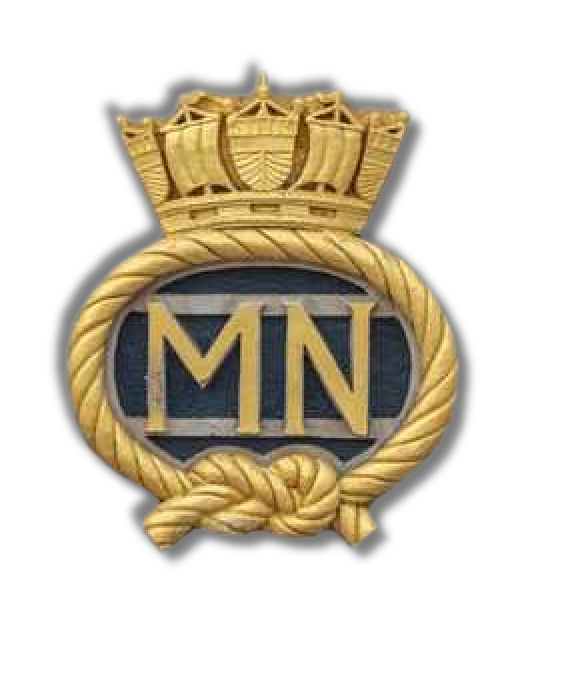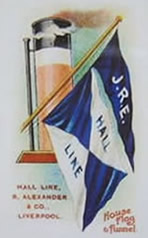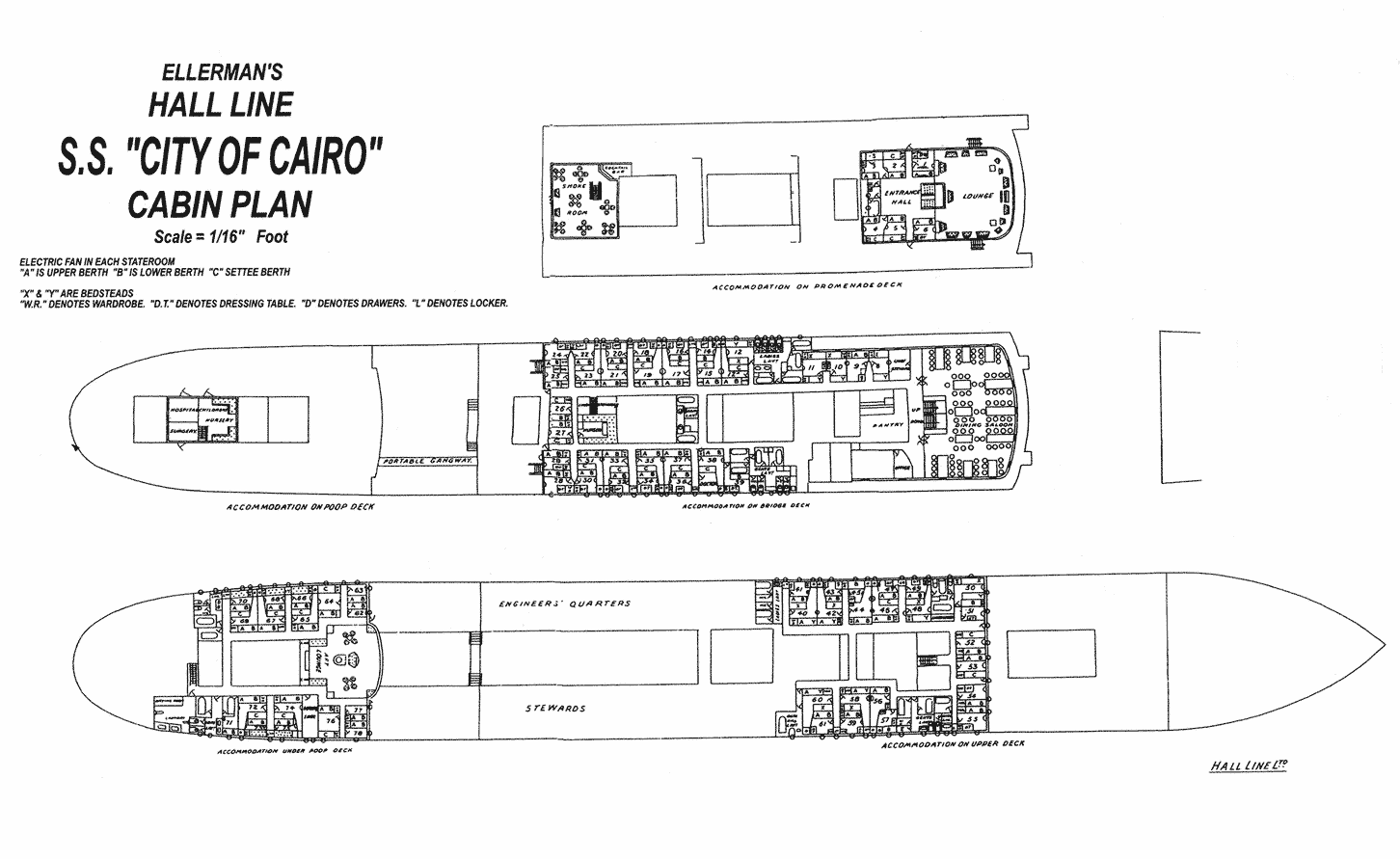Clifford L. Smith's Letter
The following is the letter from Clifford L. Smith, Second Radio Officer on the ss "BENDORAN" that picked up Boat No.8 on 19th November 1942, addressed to Gerald Simms (husband of Eileen Simms, and father of Mary, David, Lisa and Esther Simms).
The letter is courtesy of who was a ten year-old at the time of the sinking.
Dear Sir,
The subject of this letter is now rather ancient history, but having undertaken to do so, I am giving some details of the successful conclusion of your family's sea adventure.
I am 2nd sparks on the cargo ship which picked up their lifeboat after an unpleasant 14 days adrift. When you consider the chances against any ship meeting any boat in the Atlantic it must seem to you as it did to us a remarkable piece of luck, if nothing more, that we happened to be there at the time. A fraction of a degree of difference in course or speed, a few minutes indifference on part of the lookout man and the result might have been very different.
However, be that as it may at about 7 a.m. one day the top of a sail was spotted and the Capt. altered course so as to investigate. I was sleeping at the time but was awakened by the blast on the whistle which was sounded so as to advise the boat's crew that they had been seen. I tumbled out onto the deck in pyjamas and saw the boat still some miles off. One of my shipmates suggested that I should get dressed as there might be ladies present, which got a laugh. But a little later through my telescope I could distinguish both ladies and children, whereupon dress I did.
As we came up to the boat we waved and shouted a greeting and a few of the occupants waved back. What a pitiful sight that was, there were fifty people in the lifeboat, crowded so that movement was impossible. Forward were the Indians of the crew aft the whites. Filthy clothes, discoloured and stiff with salt, hair matted, faces raw and lips cracked with exposure, their eyes looked up with a dazed and unbelieving expression. Rescue nets were lowered and several of us climbed down and carried up the 8 children, then the women, then the men.
I was on deck and carried the children amidships into the saloon. Breakfast was on the table and the sight of the food, commonplace enough to us was a miraculous vision to them. They couldn't take their eyes off it. Their first demand naturally enough was water, so we gave them tiny sips. The poor kids couldn't understand why we could not let them drink deeply. They tried to grab the cups and cried in week painful sobs which were enough to break your heart. Lisa was particularly upset and it took all my powers of persuasion to get the cup away from her temporarily. I don't think I am unduly tender-hearted but the sight of the saloon crowded with those pitifully grateful people was too much for me. Well, they all had a drink and after a period of grateful rest on real chairs for the grownups and a babel of information from the children, we cleaned them up and put them to bed in bunks or settees or mattresses on the deck.
As David was being washed he asked me very seriously whether I thought he could make Horlicks malted milk by dissolving ration milk tablets in water. He'd been saving tablets for the experiment and had obviously given much thought to it. Your baby was looking wonderfully well and was asking for food from the table. I looked at her all the time and wondered how she had come through that nightmare experience and look so fit until I learned that she had had most of your wife's food and water as well as her own. Mary was very quick. Her eyes looked enormous in her emaciated face, and her whole appearance was fragile in the extreme. It seemed to me that she realised exactly what her rescue meant and what might have been. For the first day or two they slept, and had drink after drink in their waking moments. They said that the water didn't satisfy them: there seemed to be a fur in their mouths that wouldn't go away. They were allowed to have a little gruel and found it heavenly.
On the second day the children ventured out on deck, very weak and tottery and with no sense of balance at first, but with brains and tongues working with full efficiency. We did what we could to rig them out in clean gear and homemade shoes and to answer their endless questions. With their recovery began the grandest time I have had for years. I am extremely fond of kids, have a ten year old son of my own evacuated to Canada and unseen for over 2 years whom I miss like hell. We had been at sea for seven weeks with no sight of land even, and were pretty stale so that these 8 children (4 belonging to another family) were a heaven-sent gift.
We sang songs, we played games, we turned the saloon into a bear garden. Mates, engineers, and all joined in and loved it. You can't need me to tell you that your children are brilliant. They played games that many adults find too much of a brain fag and called for more. Mary is a delightful character, isn't she? Her brain is amazingly mature for her age and she seems to have gone beyond the stage of exasperation at the slow wits of adults at which David has arrived. Lisa with her gamine grin and tottering walk was a prime favourite with all hands. Physically, I think, she suffered more than any of them during the time on the boat.
So while the grownups slowly recovered we rejoiced with the youngsters. Their conversations with regard to the period on the boat were really interesting and gave absolute evidence of the adaptability of the child mind. They discussed the deaths of some of the natives and the fatal illness of one of the passengers in a very matter of fact manner, entirely without the bated breath and horror which the subject used to arouse in me. No doubt the whole experience made a vivid impression on them. Their attitude now was: "We're rescued now; all that has passed is an interesting experience, possibly to be bragged about, but certainly not to be worried about".
So they strolled round the ship welcomed everywhere, friendly with everyone, absurd in their ridiculously oversized borrowed clothes. Each day they grew visibly stronger and steadier on their feet, Mary in particular lost her fragile appearance. It seemed to me that none of them was likely to suffer permanent after-effects, and I hope that they are fully recovered. Your wife was suffering as were other adults, from intermittent leg pains as well as general stiffness and weakness but was able to walk round fairly well. I hope that she too is quite well.
Luckily we had no untoward experiences while they were aboard, and for me the times passed far too quickly. It was a wrench parting from them and the old ship was a silent and gloomy place when they had gone. You will know all about that. I look back on the days of their company as a bright and happy period in the midst of a futile and empty waste.
Yours sincerely, Clifford L. Smith.






